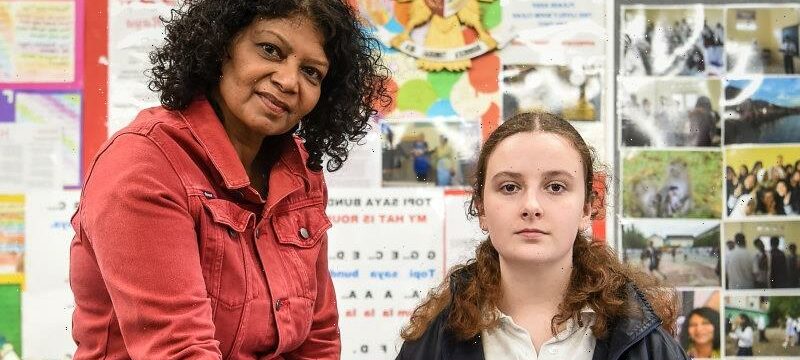Heathmont College’s Indonesian language program was “dying” when teacher Prema Devathas arrived at the school 10 years ago.
Students at the eastern suburban government school had few opportunities to speak the language outside of class and felt little sense of connection with Indonesian culture. Enrolments had tanked.
Year 11 Heathmont College student Sophie Rees with her Indonesian teacher Prema Devathas.Credit:Justin McManus
To revive the program, Ms Devathas built a sister-school partnership with a leading school in Yogyakarta, giving students a forum to speak Bahasa with Indonesian peers via Skype and even visit, where they sit in an Indonesian classroom for a week.
“We have to make it authentic and make it meaningful and tie it to their lives, that’s why the Indonesian tour and the sister-school partnership matters,” Ms Devathas said.
The pandemic has set back Heathmont’s program at VCE level, with just one student due to sit the year 12 Indonesian language exam on Wednesday, but interest remains strong at younger year levels, Ms Devathas said.
In this regard, Heathmont is bucking the trend. Indonesian is falling out of favour Victoria, where 19 schools cancelled their programs last year.
Just 215 VCE students completed the subject last year out of a total of 61,929 who studied it, mostly in primary schools. This compared to 1374 who completed the VCE exam for Mandarin.
In the five years to 2020, the number of Victorian government school students learning Indonesian has fallen at primary and secondary school levels, by 9 per cent and 3 per cent respectively, a new report for the Department of Education and Training reveals.
Enrolments in Indonesian have flatlined while other languages that are taught widely in Victorian schools – Mandarin, Japanese, Italian, French and Auslan – have had solid growth.
While Indonesian has been widely taught in Australian schools since the 1950s and enjoyed a boom in the 1990s, its decline is part of a national trend that has led Melbourne University’s Asia Education Foundation to warn the subject is at risk here.
Foundation executive director Hamish Curry said schools were opting out of Indonesian for various reasons, including student preference and a shrinking pool of proficient teachers.
“Indonesian has got the double whammy where the language is already in decline and in the next five to 10 years there’s going to be far fewer teachers who can teach it,” he said.
Students are also influenced by their parents, who in many cases have a negative perception of Indonesia as “an unsafe country,” Mr Curry said.
Victorian schools can choose which language they teach, but that choice is significantly influenced by teacher availability, said Yvette Slaughter, a senior lecturer at the Melbourne Graduate School of Education.
“It’s a bit of a vicious cycle of numbers decline, programs drop, teacher numbers decrease and it’s very hard to build up again,” Dr Slaughter said.
In the 1960s and ’70s a wave of graduate teachers trained in French and Indonesian emerged from universities, but that cohort is retiring and recent graduates are much more likely to have been trained in Mandarin and Japanese, she said.
The Asia Education Foundation released a rationale for why schools should teach Indonesian last month, arguing that learning the language is critical to creating “a strong and fruitful future relationship with the country’s largest neighbour and a key trade and diplomatic partner”.
Fiona Carnell has taught Indonesian for 30 years, initially to prisoners inside Pentridge and these days at Billanook College, an independent school in Mooroolbark.
Interest in studying the language is heavily influenced by news cycles, she said, noting that it took its biggest hit in the aftermath of the Bali bombing in 2002.
“I saw numbers dip substantially; that was largely parents having an influence over what language their children should learn,” Ms Carnell said.
Ms Carnell harnesses wider misunderstanding about Indonesia to spur her students to stick with the language.
“I use that to my advantage; I talk about how ignorance can promote fear and that we have to be as educated as possible,” she said.
Sophie Rees, a year 11 student at Heathmont College, began to learn the language in grade 3 and has already committed to it in year 12.
Though Sophie is yet to visit Indonesia, she plans to and believes her years of study have been the perfect preparation.
“I’ve just found it to be a really great experience and I think it’s really important to learn a new language,” she said.
Fascinating answers to perplexing questions delivered to your inbox every week. Sign up to get our new Explainer newsletter here.
Most Viewed in National
From our partners
Source: Read Full Article

